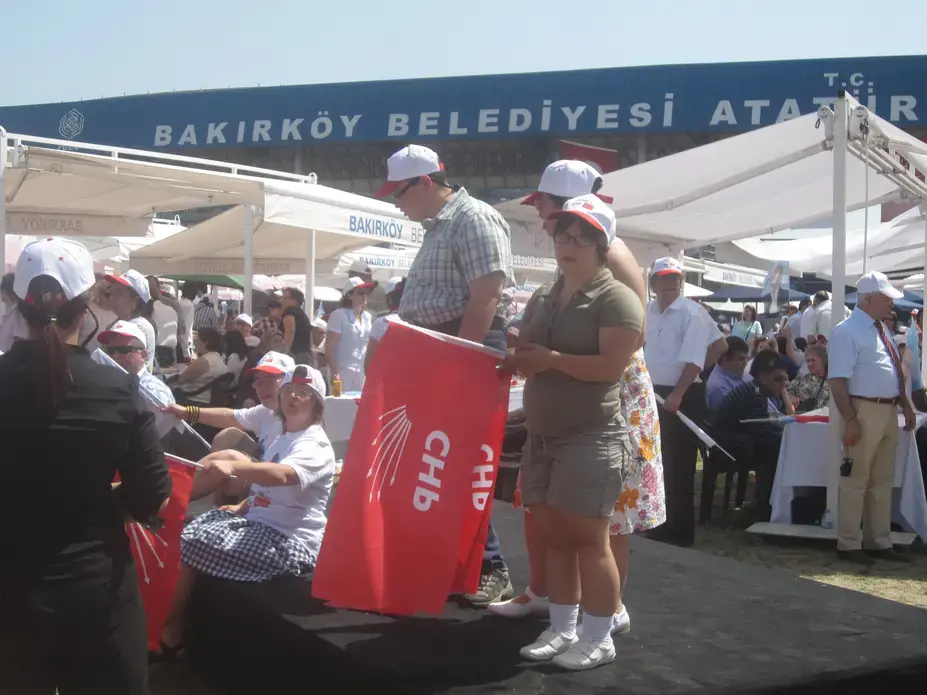ISTANBUL, Turkey -- It gives Şafak Pavey goosebumps to talk about it: the thousands of disabled children in Turkey who live hidden from view, out of sight of neighbors, of guests, of the community.
"When I visit very poor houses in areas in Istanbul, or the Black sea or Izmir," said Pavey, 34, a newly-elected member of Turkeys parliament from the countrys main opposition party, who lost her left arm and leg in a train accident, "in every other house, there is a disabled kid hidden in the back garden. If I stay for long enough, for an hour or two, they come out."
According to a 2002 government study, an estimated 8.5 million disabled people live in Turkey, at the time nearly 13 percent of the population, which has since grown to 79 million people. But walking around a major city like Istanbul, one would never know. The disabled are kept sequestered at home, a source of shame for the family. And how could someone with physical challenges navigate such a city anyway, with its steep hills, busted-up sidewalks and crowded, cobblestone streets?
The week before the elections, though, Pavey and Kemal Kılıçdaroğlu, the leader of the main opposition party the Republican Peoples Party (CHP), met with nearly 2,500 disabled voters and their families at a large rally on a sweltering Istanbul morning at the Ataturk stadium in Bakirkoy, a middle-class neighborhood by the airport. Dozens of people with visual, hearing and speech impairments, the physically and mentally challenged, and elderly citizens waved flags and lined up to shake Paveys hand.
In 2005, the AKP-led government adopted Turkeys first Disability Law, part of its process of EU harmonization. (The laws title uses an outdated word for disabled, Özürlüle, that translates roughly to "defective," instead of a more contemporary term, engelliler, which connotes barriers.) In 2007, Turkey signed the United Nations Convention on the Rights of the Persons with Disabilities, ratifying it in 2009. But a change in the classification system in 2006, from a scale based on functionality to one that interprets disability very literally, meant that many people no longer qualified for benefits they had formerly received.
Bülent Küçükaslan, the founder of a website called The Disabled and Their Friends, received thousands of complaints about the change on the sites discussion forum. He recounted the story of a man he knows with polio, who has been employed since 1990. Until 2006, he was considered 45 percent disabled, which would have enabled him to apply for early retirement. After the change, his classification is below 40 percent, barring him from early retirement. As a result, he will have to work an extra 10 years.
The prevalence of disability in Turkey is roughly on par with other countries; in the United States, by some estimates, its approximately 12 percent, and a new report from the World Health Organization estimated that 15 percent of the global population, or 1 billion people, are disabled. But Pavey says that several of the causes -- particularly poor hygiene and kinship marriage, a term for marriage between cousins or other members of the same extended family --are relatively easy to target.
"Dust," she said simply, "particularly in the southeast. Dust is very basic, but it makes kids turn blind at very early ages," something she has seen from her work in refugee camps. Kinship marriage is another factor that, so far, politicians and religious leaders have refused to address.
"Its one of the biggest causes, and its not being discussed in Turkey," she said. "Its everywhere, yet its almost a secret."
Pavey, who represents the Anatolian side of Istanbul, was one of 14 disabled candidates from her party seeking to claim a seat in Turkeys 550-member parliament, although she is running as a mainstream candidate, and not as part of a quota. The ruling Justice and Development Party (AKP) put forward 11 disabled candidates on their lists of nominees, but many were lower down on the party lists, decreasing their chances of actually winning a seat.
According to Dikmen Bezmez, a sociology professor at Bahcesehir University who researches disability in Turkey, politicians have figured out that talking about disability is an easy way to score points with the Turkish public.
"Politicians have discovered a field, which, compared to some of the other issues high on the agenda, is not risky at all," she said. "The idea is it is a good thing to help disabled people, even though in practice there are many cases of maltreatment."
Comparing a disability to a stone thrown in water, Pavey noted that, for every disabled person in Turkey, there are at least four people (often family members) whose lives are deeply affected by its ripple effect. At least 33 million people, according to her logic, stand to benefit from inclusive policies that reduce barriers to health care, education, employment and the active participation they have so long been denied in Turkish society. Currently, an estimated 98 percent of the disabled rely on family members for care.
At the two-hour rally, the CHP constituents enjoyed a hearty Turkish breakfast under tents shielding them from a merciless sun. Sweet buns, olives and hard-boiled eggs, tomatoes and cucumbers, honey, cheese and jams were served courtesy of the party, and volunteers tramped back and forth across the grass refilling plastic cups of hot, strong Turkish tea.
Supporter Ramazan Bag, 42, is blind, as are two of his three brothers. "We are victims of kinship marriage," he explained. A university graduate in philosophy ("I think, therefore I am," he said, before jokingly telling me Im beautiful), he is now married with two children and works as a telephone operator.
He called Kılıçdaroğlu "a new hope for Turkish people," citing his secular views and fear of "becoming Iran" under the current Islamist government. He added that he objects to the AKPs neoliberal economic policies.
"This form of capitalism is very bad," he said. "I think we need a social state: more economic development, more education, more employment." He earns 2000 Turkish lira a month, approximately $1,268, but said he needs additional support from the government.
"My life is more expensive than for other people. Other people can go anywhere by walking, I must call a taxi, and it is expensive." Currently, the state allocates a maximum of 292 lira per month for persons with disabilities in need of care, according to a shadow report submitted to the United Nations Committee on Economic, Social and Cultural Rights in May of 2010. The report noted that with these sums, "The only thing guaranteed is a life at the hunger level."
"Every Friday [when observant Muslims attend services at mosques] can be used very effectively in this country, but they wont talk about it. Then they claim these kids born out of these marriages are sinful and have to be hidden."
Throughout her short campaign, she has heard variations of the same shocking sentiment repeated over and over again
"Families with disabled children are praying for their kids to die before them, because they have no support systems. They are very scared about who will take care of their kids, and how their kids will have a dignified life after they die," she said. "It doesnt matter if they vote for CHP or not. They all pray for that."
Eric Rosenthal, the founder and director of Disability Rights International, found similar sentiments when researching a two-year investigation into conditions at Turkeys mental health facilities, the findings of which he published in a 2005 report, "Behind Closed Doors." The director of a private school for children with mental disabilities, whose own daughter is disabled, told researchers, "I do not want her ever to have to live in the institution."
After the report was released, the AKP-led government halted some of the most egregious violations that he and his colleagues had found, such as the use of unmodified electroconvulsive therapy (commonly known as "shock treatment"), a procedure that the European Committee for the Prevention of Torture considers tantamount to torture. But other recommendations, he said, went unheeded.
"For a very small investment of resources, they could have closed down a lot of these places, and integrated the people there," he said, instead of isolating them away from the larger population. "Like at a run-down facility outside of Ankara. But against all logic, they poured money into this crumbling place and rebuilt it. They put a lot of money into doing the opposite of the right thing."
Fatma Zengin works at Rusihak, a human rights organization focusing on the rights of the mentally disabled. For the past three years, she and her colleagues have been pressing the government to adopt community-based mental health care. This year, the government opened ten centers, but she says that those operating and staffing the centers have little understanding of a rights-based approach that includes disabled people themselves in decision-making capacities. "They open centers, train staff, and give services, but they dont ask them to participate on an equal and non-discriminative level in the provision of these services," she said
According to Pavey, this is no accident. She jokingly refers to the AKP as the "Party of Concrete," due to their predilection for large (and lucrative) construction projects.
Küçükaslan said he is deeply skeptical of all of Turkeys political parties, even the CHP.
"In Turkey there is no single political party, nor is there any NGO, that has put out a comprehensive policy on the problems of people with disabilities and the discrimination they face," he said. "All of them have a charity-based attitude."
This is something Pavey, who worked for eight years for the United Nations on humanitarian and human rights issues, hopes to change. As a member of Parliament, she hopes to mainstream disability issues across ministries, rather than having a separate office. The budget, she said, should come from the budget for human rights.
But even at the CHP rally for disabled constituents, old prejudices remain.
Emre Firat Yocip, a handsome, mute 20-year-old high school graduate, stopped his breakfast to answer some of my questions with the assistance of a sign language interpreter. Perhaps in her eagerness to help, the interpreter answered several of my questions for Yocip without bothering to ask him. Each time, I stopped her to ask if we could get his response. And each time, when I looked up from my notebook, I saw him smiling patiently, waving his hand at her, waiting to be heard.







